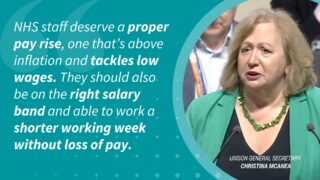Working people need the economy to benefit all of us, not just a lucky few. Politicians will miss the opportunities provided by devolved powers, unless we fix the West of England growth strategy.
Last week, we set out five problems in WECA’s growth strategy. Trade unions are about practical solutions, so here are five options to refocus the plan on jobs, skills and public services.
-
WECA needs to lead the charge on good jobs
Get good jobs right, and so much else comes with it. It’s not far-fetched to say that everybody should be able to get a good job.
To fix the West of England growth strategy, WECA should work with unions to define a Good Work Charter. Business support services would identify sectors with few good jobs, or the potential to create many more. The metro-mayor can use his bully pulpit to commit employers to the Charter, and put Good Work conditions on access to public procurement, funding and participation in enterprise zones.
-
Beat the productivity crisis with a lifelong skills plan
As Brexit approaches there will be skills gaps to fill, but it won’t happen with a tired “employers know best” approach. A better fix for the West of England growth strategy would see skills programmes, including the £3.9m DWP pilot, co-designed by unions too.
Skills pathways should connect people from areas with few top level industries into high-skill jobs. The metro-mayor needs to charm and twist arms to convince employers to participate. Improving low to mid skilled work is also vital as these sectors provide the most jobs but don’t make full use of training to improve productivity.
The best courses won’t matter if the right staff don’t access them. Union learning reps have a track record getting people back into learning. We also make sure apprenticeships are about real training, not cynically using low-paid apprentices to replace other staff.
-
Make the West of England a Real Living Wage region
Too many jobs fail the most basic test – they don’t pay enough to live on. 7.4 million people in working families are in poverty.
To fix the West of England growth strategy, the metro-mayor should set a goal that no one needs to earn less than the living wage – £8.45 an hour. It’s good for workers, and it’s good for business, improving recruitment, retention and productivity as well as reducing sickness absence.
Becoming a living wage region will be tougher for some. WECA should target support in areas like social care, where funding pressures are catastrophic. But for public institutions and firms where the step up is manageable, the message from the metro mayor must be that poverty pay is not acceptable.
-
Set the West’s brains trusts to improving care as well as composites
University researchers have shown their success spinning out projects into commercial opportunities. But studies on industries many of our people work in are more often about poor employment practices. With a guaranteed market from the public sector at least, the West’s universities can be brought onboard to innovate in public services and the foundational economy.
In the care sector, for instance, by 2025 another 353,000 people will need help. So where is the urgency to find solutions? Let’s make it a priority as government has done for nano-materials.
-
Find new ways to finance the infrastructure the region needs
Though WECA’s £30 million a year pot sounds good, it’s not enough compared to the costs of housing and transport. The metro-mayor needs to make the money go further.
One option is to borrow against future rises in business rate revenues. The three WECA authorities receiving reasonable business rates as firms want to base themselves here. They’re also set to benefit from 100% (up from 50%) business rate retention.
Another possibility is to team up with the Avon pension fund to secure money for housing and other long term “safe” investments. WECA can guarantee returns, while the total amount invested by the pension scheme is far greater. Preston council raised £100m using a similar plan.
Finally, with great potential for wind and tidal energy in the region, the metro-mayor should take a stake in renewable energy that can generate funds for years to come.
Is that it?
To really fix the West of England growth strategy requires a social partnership between politicians, firms, and unions. Unless we make a success of this round of devolution then further opportunities won’t appear.
These five ideas don’t amount to a worked-out programme, but it’s clear that WECA must be far more radical, and that the potential is there for it to be so.



